
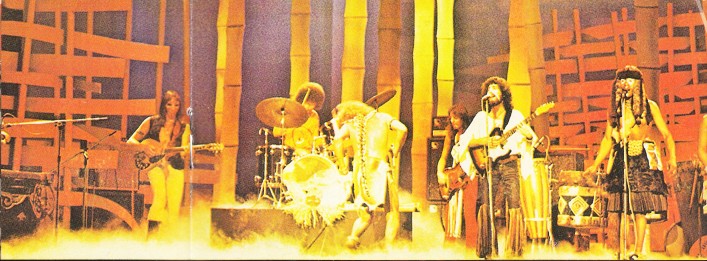
The online South African Rock Encyclopedia covers the history of South African rock music from the 1950s up to the early 2000s. All this information is made freely available to the public.
Home > Rock Legends > 1970s > Hawk > Discography > Africa She Too Can Cry
Releases:
South Africa | Europe | Japan | Official CD | Singles

Africa She Too Can Cry (LP 1972, Gatefold) | Collectors World
This classic album has been released at least 4 times with different track listings. It was first released in 1972 in South Africa. It was then released in 1973 in Europe with a slightly different track list and credited to Jo'Burg Hawk. In 1998 an unofficial CD was released by the Never Never Land label in Japan with a different cover and track list. In January 2004 Retrofresh released a CD of the European version with bonus tracks.
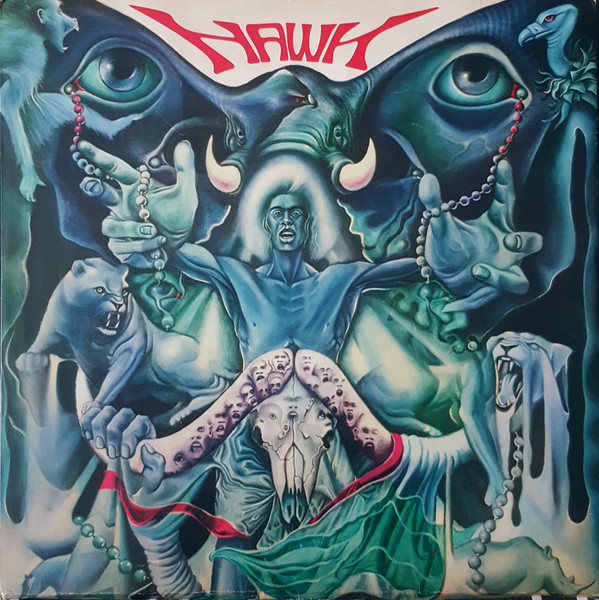
Africa She Too Can Cry (LP 1972)
The album cover was a gatefold with the image actually sideways. It is shown here in the "wrong" position for better effect. Cover painting was by B. Funnêll. The European album release has the same cover, but "Hawk" is replaced with "Jo'Burg Hawk".
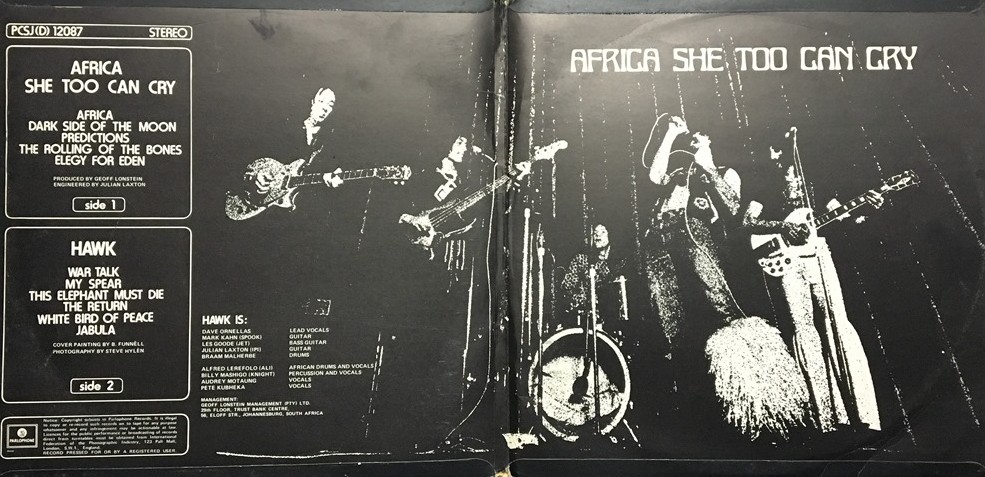
Africa She Too Can Cry (LP 1972, Gatefold Inner) | Collectors World
The track "Africa" contains the lyrics "Africa she too can cry".
Tracks 1, 2, 4, 5, 6, & 11 released on the 2004 official CD.
Tracks 3, 7, 9 & 10 released as bonus tracks on the 2010 re-issue of Live And Well.
Track 8, "This Elephant Must Die", is only available on an official CD as part of the "African Day Suite" (from about 4:00, but slightly shorter) on the 2004 official CD.
LP: 1972, EMI Parlophone, PCSJ (D) 12087
Bas Möllenkramer, Soest, the Netherlands
October 2000
What is it that makes this album so special? To this reviewer Africa She Too Can Cry is a peerless South African rock album that still sounds as powerful today as it did when it was released back in 1972. It is the ultimate Afro-Rock album and I believe nothing else comes close.
Although this album has an extremely short total playing time, clocking it at just over 33 and a half minutes, the experience of listening to it all in one go, leaves the listener with a feeling of totally satisfied exhaustion. Only silence will do after hearing this record. The Doors' L.A. Woman is 15 minutes longer and Pink Floyd's Atom Heart Mother is a whopping 20 minutes longer than this, yet the record is absolutely full of superb music.
This album has everything going for it. Supplied in an arresting sleeve, with a full lyric sheet enclosed, it has 11 stunning songs, without a single weak spot in sight anywhere. The recorded sound is unmatched in any contemporary release and still stands proud as a model for a great sounding album to any generation.
Even when you become familiar with the record, you still feel at the end of every song "OK what's next? Oh yes the best track on the album". That's the only problem with Africa She Too Can Cry; every song is the standout masterpiece and the energy keeps you high during the entire listening time. Every song has a huge walloping goosebump moment when something awesome happens. Every track is the best track on the record! The songwriting and the arrangements are supreme.
The instrumentation is based around a telepathic rhythm trio consisting of drums, bass guitar and acoustic guitar. Sound familiar? That's why the Who's Pinball Wizard sounds so great. Nearly everywhere it sounds as if these three instruments are being played by a single brain. The accuracy and swing of this musical basis is a potent driving force that underpins the entire album magnificently. Surely this is one of the best rehearsed rock albums ever. And for a bass-player like myself, the album is a special treat. This is one of the few albums in my entire collection of which I could truly say that I can identify clearly every note that the bass played. The bass sounds phenomenal. But the other instruments also sound stunningly clear. The cymbals are recorded with all their brilliant ultra-high treble tones fully intact. And the voices are so clear you can hear the singers breathe.
The steam locomotive of a rhythm trio that powers Hawk, is further embellished by the unmistakable voice of Dave Ornellas, who sings as if he is possessed. He absolutely believes every word, and rants and raves about themes as diverse as poaching and pollution.
But that is not all. An incredible wash of colour is added by no less than four superb voices and an array of exciting percussion instruments. In fact the voices kick the album off with the enigmatic opening line "Once upon a time....there was a garden......". They are followed by a quiet folk-like intro of acoustic guitar and voice. But when the whole band kicks in, you just know nothing can go wrong in the next half hour.
So is that a recipe for a winning record? Surely yes? But Hawk went one step further still and added one of the most distinctive guitarists on the planet, Julian Laxton. With his patented Gibson/Spitfire/Hurricane sound he adds the weight to this ultimate afro-rock album. His guitar sound is given plenty of room in the mix and while the acoustic guitar is fairly dry and close up, sounding like it's right there in the room with you, the electric guitar sounds like it's somewhere in the stratosphere about to dive bomb the proceedings. Apart from devastating solo guitar work Julian Laxton also did the engineering for this milestone record. Lastly we shouldn't forget the contributions by several uncredited keyboard players. Big wide piano chords and morse-code organ add colour here and there.
So is there anything wrong with the album? Nope. Or perhaps we should say that there isn't a gentle ballad anywhere. But somehow you know when you start off, that you aren't going to be allowed to relax. This album is 33 and a half minutes of pure artistic energy. As the last notes die away you just sit there thinking "J.... what hit me?"
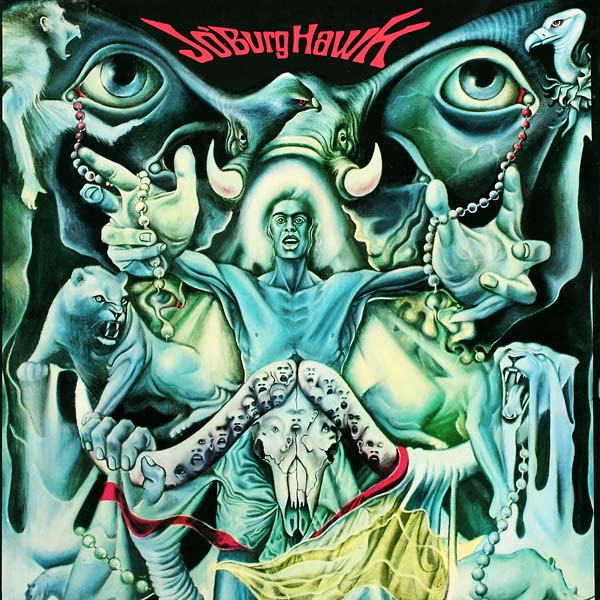
Jo'Burg Hawk (LP 1973)
The album cover was a gatefold with the image actually sideways. It is shown here in the "wrong" position for better effect. Cover painting was by B. Funnêll. Same cover as the South African album, but "Hawk" is replaced with "Jo'Burg Hawk".
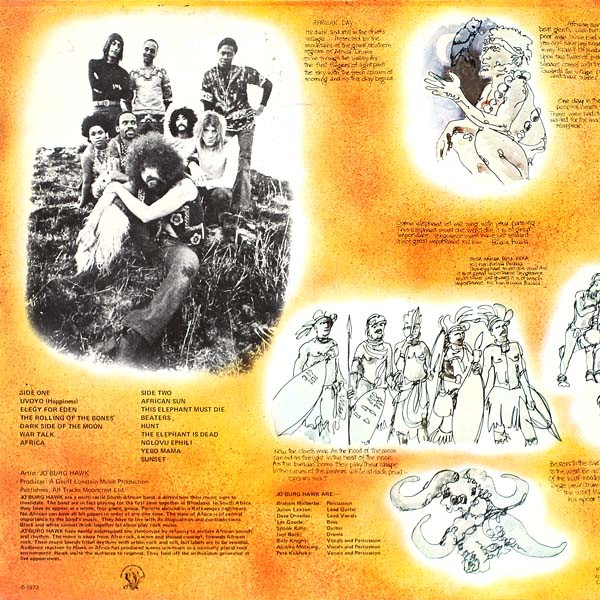
Jo'Burg Hawk (LP 1973, Gatefold Inner) | Discogs
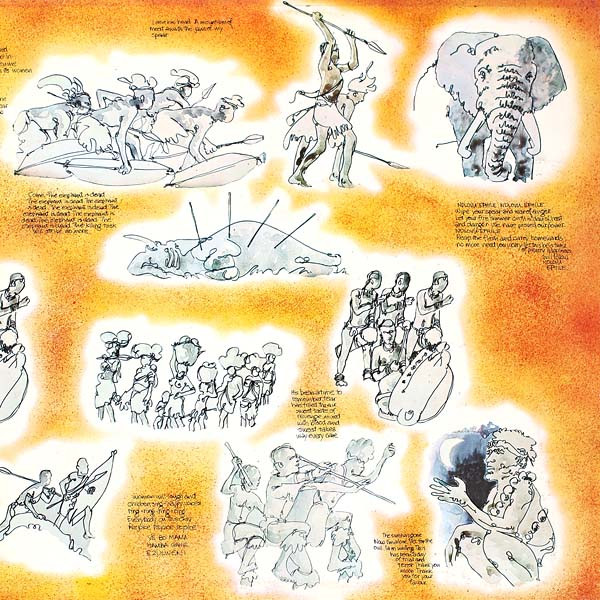
Jo'Burg Hawk (LP 1973, Gatefold Inner) | Discogs
Tracks 7, 10 & 12 are 1972 re-recordings of sections of the 'African Day' suite from the 1971 African Day album.
On the 2004 CD re-issue tracks 7 to 14 are grouped together as a single track, the "African Day Suite".
LP: UK 1973, Charisma, CAS 1064
LP: Europe, Australia 1973, Charisma, 6369 928
LP: UK 1984, Charisma, CHC 20
CD: South Africa 2004, RetroFresh, freshcd137 Official CD re-issue with bonus tracks
Record Collector magazine issue #222 (February 1998) listed an album titled simply Jo'Burg Hawk that was released in February 1973 on the Charisma label with catalogue number CAS 1064.
Sweden: I am 24 years old and a university student. When I was about 6 or 7 or so I got hold of this fantastic album, Jo'burg Hawk's Africa she too can cry from 1973. This has haunted me thru the years and I find it an all time great. I have never had a chance to learn more about this band so this day when I found your website about their records I got stunned. I didn't know they had a previous album (African day) but I can tell you that I could walk thru fire for that album. I suppose that the chance that their album ever got out on CD are minimal. That's unfortunate since my only vinyl is really torn down and scratchy. I am a bit confused about the tracklisting you had written down.
Krister, Sweden, April 1999
Rare Record: Just another interesting piece of info, Record Collector's Rare Record Price Guide 2000 lists Jo'Burg Hawk's single 'Orang Outang/Dark side of the moon' (Charisma CB 194) released in '72 as being worth £4 in mint condition while the LP 'Jo'Burg Hawk' (LP with gatefold sleeve) (Charisma CAS 1064) released in '73 as being worth £12 in mint condition. This would be referring to the UK release. Not a fortune, but hey, it's better than a kick in the teeth I guess.
John Samson, May 2000
Bas Möllenkramer, Soest, the Netherlands
October 2000
Released about a year after the original album, on the English Charisma label, this record is a mixture of Africa She Too Can Cry and the previous Hawk album
African Day. To explain this it's best to go backwards. That first album was named after its title track which took up the whole of side two. It tells the story of an elephant hunt, no longer politically correct but nevertheless an exciting musical tale in the context of the era.
The track African Day was re-recorded for the European album, and once again featured on side two, but now as separate songs, with This Elephant Must Die thrown in for topicality. This was not part of the original side-long track.
Of the eleven songs which comprised the original South African release of Africa She Too Can Cry, four had to make way, these being The Return, Predictions, My Spear and White Bird Of Peace. That was a sad loss indeed. The remaining tracks were presented in a totally different order, mostly on side one, with one of them being integrated in the epic b-side, as outlined above.
This reviewer is of the opinion that the album was substantially weakened by this apparently arbitrary reshuffling. However it is nevertheless recommended as second-best if an original South African record cannot be found. The inner sleeve depicted hand-drawn images of the elephant hunt with hand-written notes outlining the story. The South African album instead shows a grainy black-and -white photo hinting at the exciting stage presence of Hawk. Indeed this reviewer was mesmerised by the Rhodesian introduction of Africa She Too Can Cry in live concert in the Rhodes Cinema, in Salisbury on 22 July 1972 (seat O-18!). The headline act the Troggs had to take a back seat to the excitement of Hawk.
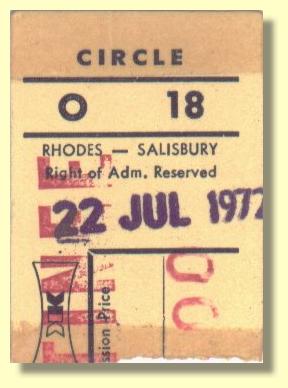
Ticket
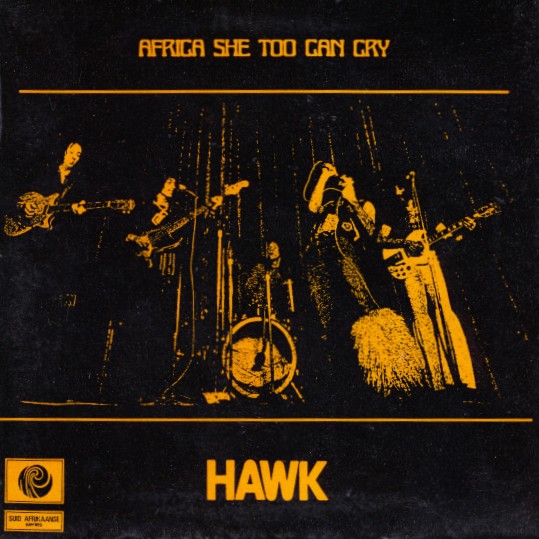
Africa She Too Can Cry (Unofficial CD, Japan 1998)
CD: 1998, Never Never Land, 758036 011
More a compilation than a CD re-issue, this unofficial CD includes tracks from the original "Africa She Too Can Cry" album, however it features the original version of the side-long track African Day, rather than the "African Day Suite" (tracks 7-14) from the "Jo'Burg Hawk" album, and also includes a track off Hawk's last album "Live And Well" (which is not actually a "live" album).
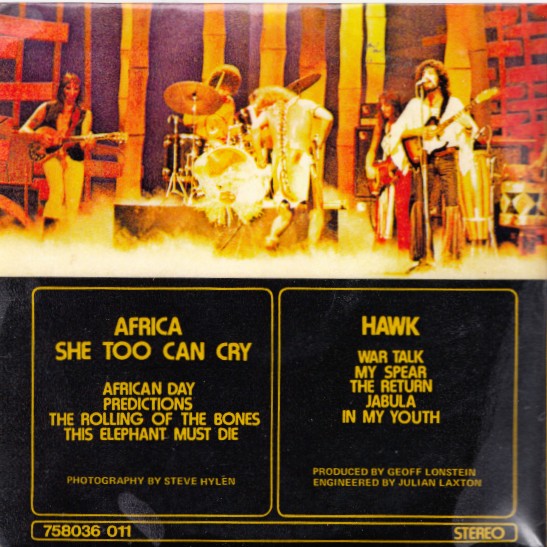
Africa She Too Can Cry (Unofficial CD, Japan 1998, Back cover)
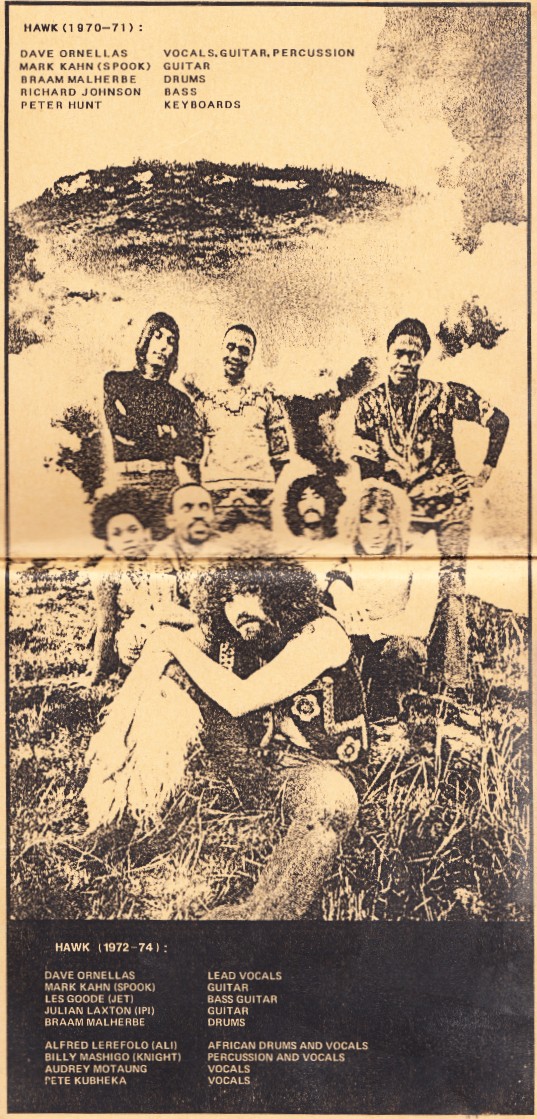
Africa She Too Can Cry (Unofficial CD, Japan 1998, Inner)
CD generously supplied by Leon Economides.
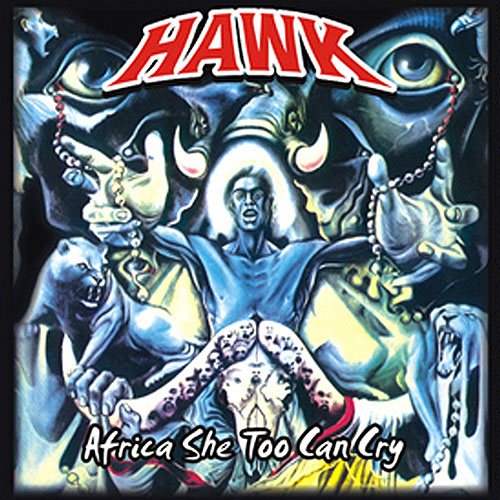
Bonus tracks
Track 7 is a 1972 re-recording of the 'African Day' suite from the 1971 African Day album with some revised sections.
CD: 2004, RetroFresh, freshcd137
'Predictions' (from the original South African version of 'Africa She Too Can Cry', but left off the European release and the 2004 CD re-issue) is available on a Retrofresh compilation titled 'Astral Daze - Psychedelic South African Rock 1968-1972' released in February 2006. This CD features 18 classic, rare and obscure tracks (16 of which have never previously been released on official CDs before). This CD was compiled by Benjy Mudie and Brian Currin with major input from SA rock collector Tertius Louw.
Here is a quote from an email received in 1999 from Krister in Sweden: "I am 24 years old and a university student. When I was about 6 or 7 or so I got hold of this fantastic album, Jo'burg Hawk's 'Africa she too can cry' from 1973. This has haunted me thru the years and I find it an all time great. I suppose that the chance that their album ever got out on CD are minimal. That's unfortunate since my only vinyl is really torn down and scratchy."
OK, Krister, your wish (and that of many others) has been granted. At last, this classic album from the '70s has been re-released on CD. This album has actually been released in 3 different versions; the first was in 1972, a year or so after the phenomenal 'African Day' album. In 1973 'Africa She Too Was Cry' was released in the UK (and Europe) by the Charisma label (home of Genesis at the time) with a revised track listing and credited to Jo'Burg Hawk. In the late '90s an unofficial CD with the same title was released by the Japanese Never Land label. Despite the fact that this was a pirate CD, it was also more of a compilation than a re-issue, as it featured tracks from all 3 Hawk albums.
After much deliberation and discussion (and lack of master recordings) Benjy Mudie of Fresh Music decided to release the UK version of 'Africa She Too Can Cry' with bonus tracks culled from some singles-only releases and the elusive 'Live And Well' album, which was not actually a "live" recording, despite its title.
The 'African Day Suite' is a re-recorded version of the side-long epic which originally appeared on 'African Day'. It tells the story, in spoken words, lyrics and music, of a rampaging elephant that threatens to destroy a tribal village and has to be killed. The fact that the censors missed the analogy to the oppressive apartheid regime at the time is amazing.
Freedom's Children's Ramsay Mackay wrote a major portion of the material for this album, and though he did not play on it, his influence is strongly felt. Mackay's compatriot in Freedom's, Julian Laxton, was a Hawk member by this time and his guitar work here is subdued but legendary. The catchy 'Dark Side Of The Moon' song has nothing to do with the Pink Floyd classic album, and in fact was released almost a year before that album's debut.
Bonus tracks include the original version of the much-covered 'Orang Outang' (Kenny Henson's Harambee, Margaret Singana, Brian Finch and more have all recorded it) which was also penned by Ramsay Mackay and released as a single in the UK in 1973. The obscure 'Kalahari Dry' song was used as part of an ad campaign for Groovy cooldrink (remember Groovy?) and released as a single in South Africa in November 1972. The original vinyl single was found lurking in Tertius Louw's extensive collection and digitally transferred by him for this CD re-issue.
The Chicago-meets-Osibisa styled 'Mumbo Jumbo' is another Ramsay Mackay composition which deserves wider exposure. The closing track of this CD re-issue is the beautiful ballad 'In My Youth' (from 'Live And Well') which sounds like it could have been written for the stageshow 'Hair'. Audrey Motaung's voice soars on this one and is then balanced by the earthy tones of Ornellas.
Excellent and detailed sleeve notes are provided by Raymond Joseph including recent interviews with vocalist Dave Ornellas and guitarist Julian Laxton.
This is truly an album of Africa and a must-have for every music fans collection.
The mighty Hawk’s second album, recorded in the UK and originally released by Charisma Records in 1973. This officially sanctioned release includes all the original vinyl tracks, 2 songs from the "Live and well" album PLUS some rare gems "Orang Outang", "Kalahari Dry", and "Mumbo Jumbo". Digitally remastered "Africa, She Too Can Cry" is a must for all connoisseurs of Afro progressive rock.
The Rise And Demise of Jo'Burg Hawk
The year is 1973 and in South Africa, the stranglehold of apartheid and the oppression of its opponents is increasing all the time, the noose growing ever tighter. These are dark and dangerous times and the watershed 1976 Soweto student uprising - which began a chain of events that would ultimately lead to the collapse of apartheid and the birth of democracy in South Africa – is still three years away.
These were strange and scary times, when the law forbade marriages across the colour bar, legislation enforced the separation of the different races – and having friends of different races could land you in trouble with the authorities. It was also a time of a huge surge in original local music, an era when South Africa produced some of its finest bands. And leading the charge was Hawk, who going against the trend, turned their backs on the music coming out of Europe and America and turned to their African musical roots.
Buoyed by the success of their first album, African Day – a thinly disguised commentary of South Africa and its insane politics - in 1971, followed by the seminal Africa She Too Can Cry, in 1972, Hawk had already established itself as one of the country's premier rock outfits. Explains Braam Malherbe, a member of the original Hawk line-up: "It (African Day) was political, you know. I mean there's the elephant destroying things left, right and centre – driving people from their land. We were making a huge comparison – if anyone had analysed the words then, they would have realised what we were all about. "Like its predecessor, Africa She Too Can Cry, was a concept album, a social commentary on the madness that was South Africa in the 1970s.
"Hawk was a concept band and the album "Africa She Too Can Cry", came at the right time, it was meant to be," says Dave Ornellas, former lead vocalist and front man for Hawk, the owner of one the definitive rock voices of his era. It tells the story of a young African man, Kakawa and his village and the people who lived in it. "It is a sad story of how the tribe was torn apart," explains Ornellas, remembering the lyrics that captured the mood of the album.
"They took me from my people,
Drove me from my home."
The album, not counting this latest reincarnation, has been released three times before, with three different track listings, first in 1972, then again in 1973 – with a slightly different track listing and credited to Jo'Burg Hawk (redone in South Africa for European release). The final release, until now, was around 1998 as an cheap bootleg CD on Japan's Never Land Label.
The European release, which was a compilation of the band's first two albums, saw the band progress from its original flute/sax/percussion and then, later, keyboard driven sound, to a new, more powerful twin guitar attack. Hawk, far from being social commentators who viewed the madness from the safety of a stage and then went home to the safety and isolation of a divided South Africa, were caught up in centre of the insane politics of the country. One of the few multi-racial bands on the scene at that time, Hawk were finding that, while there was much to write and sing about, it was becoming increasingly difficult for the band and its members to operate. Looking back today, Ornellas – now a preacher living in Muizenberg, near Cape Town - remembers those bizarre times, with the band finding it increasingly difficult to perform and grow creatively with the noose of apartheid tightening around their necks.
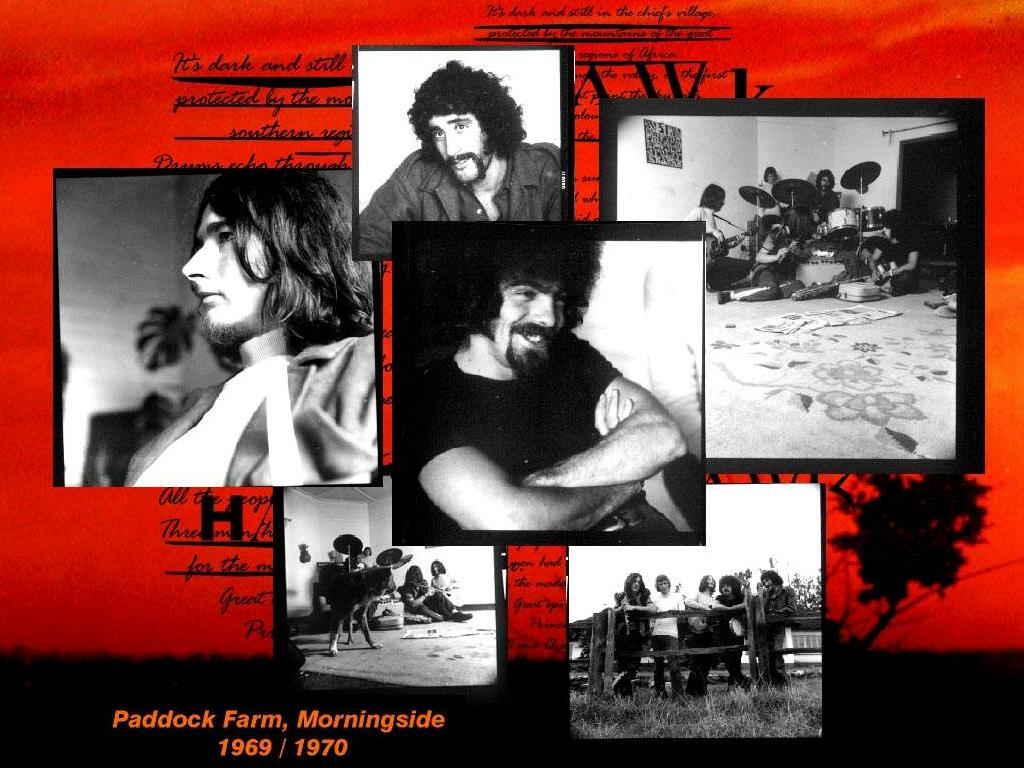
Paddock Farm 1969/1970
"I remember playing at the Klerksdorp Civic Centre. It was surreal: the black members of Hawk were not allowed to appear on stage with their white brothers. But a special concession was made and the black members were allowed to play as long as they were hidden behind a curtain on the stage. "At the same time Paddock Farm, in Morningside, in Sandton, where the band had lived since 1969 had increasingly become the focus of police raids because black and white members of Hawk were living there together."We wanted to develop the African side of our music but it was becoming increasingly clear that we could not do it in South Africa. We needed to spread our wings, break the shackles of apartheid and left the music come though. "Overnight the band was thrown a lifeline when their manager, Geoff Lonstein, signed a deal for them with the London-based Charisma records.
With the world, and particularly the UK, focused on the injustices of apartheid South Africa, the people and the media in that country welcomed the band with open arms. With Charisma driving the band, they soon found themselves working hard in London, including three gigs at the legendary Marquee club, star billing at the Reading Festival and opening for hard rock group Budgie. And with Charisma, they found themselves part of an impressive stable of some of the biggest bands around, including Genesis, Lindisfarne and Van der Graaf Generator. From a struggling outfit from the southern tip of Africa, they were suddenly receiving star treatment, with the deal negotiated by Lonstein including tickets to the UK and accommodation in a magnificent three-storey house in the plush north London suburb of Highgate.
"We were treated like real stars, with a fleet of Bentleys at the airport to collect our 16 member party when we landed in London," says Ornellas. "We thought we had arrived. "But the reality was somewhat different: despite their fancy house in one of London's best suburbs, the band was permanently broke. Their manager kept them on a shoestring budget. Both Ornellas and new guitarist Julian Laxton, who produced the album for European release, remember how they had to survive on a meagre handout of one pound a day from their management.
They had sold all their equipment before leaving South Africa and Lonstein supplied them with brand new equipment when they arrived. In hindsight, Ornellas says, the big mistake came when Lonstein signed them up to Charisma for the UK and Europe only, but kept control of South Africa and the United States for himself. Another big mistake, they say, was when they spurned a management offer from Clive Calder, then working out of a tiny office in Johannesburg. Calder went on to form Zomba Records, one of the world's biggest and most successful independent labels, which he finally sold in a multi-million pound deal in 2002.
"We backed the wrong horse and we paid the price," says Ornellas with the benefit of hindsight three decades later. "But at the time the Charisma deal Lonstein signed was our ticket to freedom and we grabbed it with both hands. "Unlike other South African bands that had tried – and failed – before them to crack it in the UK because of work permit problems, Hawk had no problem getting the right paper work because they were a multi-racial band. Their history of police harassment back home no doubt also helped smooth their entry in the UK. "We arrived in London to great hype, the press all wanted to interview us and we believed we were on our way to the big time. All the journalists wanted to make our arrival political, but we just told them we were there for the music and it would speak for us," Laxton says.
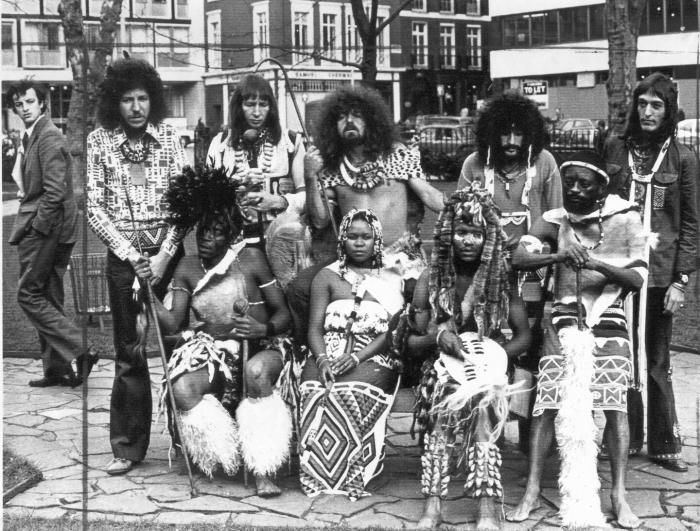
Hawk in London
"I remember the first big press interview we did in London. It was bitterly cold and we did a photo shoot for one of the papers wearing only the skimpy tribal regalia we wore during our stage act. The story appeared under the headline: The tribe who fled to freedom, neatly summing up the exhilaration and new found freedom Hawk found in London. "It was a time of concept bands and big, powerful live acts, with outfits like Pink Floyd, Genesis and King Crimson leading the charge. Into this arena Hawk arrived with their fresh African sound and a stage act and presence that blew their British audiences away. For the boys from South Africa it was a whole new world and, under the expert guidance of Charisma, the band was launched into a whirlwind of gigs, playing the club circuit, concerts and festivals. It was an exciting time for the band as they began building a solid fan base and sales of their album took off, says Ornellas.
"We were playing gigs every day of the week. Our appearance fees were getting bigger and bigger and, as a band, we were growing all the time."The deal with Charisma had also included the release of an album as Jo'Burg Hawk, a compilation of songs from their first album, "African Day" and "Africa She Too Can Cry". It also included some new songs by Ramsay McKay, the former bassist for Freedoms, which they had laid down in a studio in South Africa before setting off for London. The album, engineered by former Freedom's Children member, Julian Laxton, also saw Hawk take a new musical direction.
With the UK deal in the bag Julian agreed to join Hawk, with the band moving from its original keyboard, sax and flute sound, to the power of the two guitars of Laxton and founder member Mark "Spook" Kahn. Laxton, one of the finest rock guitarists and rock music innovators South Africa has ever produced, explains: "I was resident engineer at RPM and Geoff Lonstein, asked me to help record and produce the album for Hawk for overseas release.
Of Africa She Too Can Cry, Laxton says: "It is a very different production. It changes all the time and then reverts back. It was a good album. "The challenge in producing the album for Hawk's assault on Europe, says Laxton, was to "capture the real sound of Hawk live in a recording. I also had to capture the visual side of the band without people seeing them, with the musical side - and bring it all to life on vinyl. For Laxton and McKay it was also a fresh chance to make it big in the UK after an attempt a few years earlier by Freedoms had failed because of work permit and visa hassles. "Hawk was different. They were multi-racial and had been harassed by the police in South Africa for daring to have black and white in the same band. They got permits on that basis. Along the way Hawk was "discovered" by Belgium, leading to a tour to Brussels. Bizarrely, the band was entered as the Belgian entry for the Eurovision song festival, earning a credible ninth place and winning them an army of faithful new fans in that country.
Another highlight was touring Scandinavia at the end of 1973, where they had the audience eating out of their hands. "Here we were in the frozen north, playing full blown African rock and the audience loved it. We were on such a high. "The highly successful sell-out tour took them to Norway, Sweden and Denmark with their final appearance at Arhus in Denmark, where they were a highlight of a three-day festival held in an old airplane hangar. "We were billed as "Jo'Burg Hawk, out of Africa, direct from London. "Dressed in "war paint" and full Zulu regalia, complete with shields and spears, Hawk were one of the hits of the festival.
Remembers Ornellas: "It was one of the most incredible concerts we had ever done. It was also the last real concert we did before things went horribly wrong. "Until then things were starting to happen for the band and they were building a loyal audience in Scandinavia, Europe and the UK and the world, it seemed, was their oyster. They returned to London expecting to move on to the United States but Charisma – excluded from representing them in America because of the deal their manager had structured – by that time were starting to lose interest. "Our gigs started drying up, we were having problems with visas and this caused hassles in the band. Things just ground to a halt," says Ornellas.
First the black members of the band, homesick and disillusioned because of the ending with Charisma deal and the lack of gigs, chucked in the towel and returned home. "We were in serious trouble, we had no work and no money. We were literally starving, there was hardly any money to buy food and we were living on leftovers and handouts. "We even had to sell our African drums just to get money to buy food. It was one of the most terrible times of my life, things were just disintegrating around us."
Says Laxton: "In the beginning we were really struggling and often had very little to eat, but at least we were getting places and the band was together and sounding great. There were nine of us living in this huge house in Highgate, it was a bit like Big Brother, but then things started falling apart." Adds Ornellas: "I was so depressed that I cut off half my beard and half my Afro. I was down in the dumps, it was a cry for help, an expression of just how low I felt." The end for Ornellas finally came when Scotland Yard arrived one morning and told him their (by then) former manager had laid a charge of theft against the band and was demanding they hand over their instruments, which he said was his property.
"He wanted the PA and all our other equipment back. I thought that after we had sold everything when we left South Africa the new equipment our manager bought was ours. "Eventually I agreed to hand over the equipment to Scotland Yard until it was sorted out. I later learned that they had handed the equipment back to our ex-manager and the subsequent case was thrown out of court. "Looking back now I wonder what they thought of me, this manic musician with half an Afro and half a beard. "Soon afterwards Julian Laxton and Les Goode left for home and they were soon followed by Spook and Ramsay McKay, who had also had enough.
Says Laxton:"I call it my great escape, but it was also sad because the band was getting more and more polished and we were being recognised in London. I mean, to play the Marquee three times and be invited to Reading would be a highlight for any band." Finally Ornellas, who was involved in legal disputes and becoming increasingly depressed, was the last member of Hawk left in London.
"I was stuck there for three more months until I could get out and go back home," he remembers. "It was the end of a dream for all of us, a terrible way to end. But we gave it our best shot and I know now that we did not fail, it just didn't work out because of circumstances beyond the band's control."
And even now, in the 21st Century and 30 years later, Hawk's music has stood the test of time - and with this officially sanctioned re-release of Africa She Too Can Cry, a new chapter has been written in the short but influential life of the band, one of the most original and influential rock bands ever to come out of South Africa…
The Return (Mark Kahn) /
The Rolling Of The Bones (Ramsay Mackay) (1972), EMI Parlophone, SPD 3052
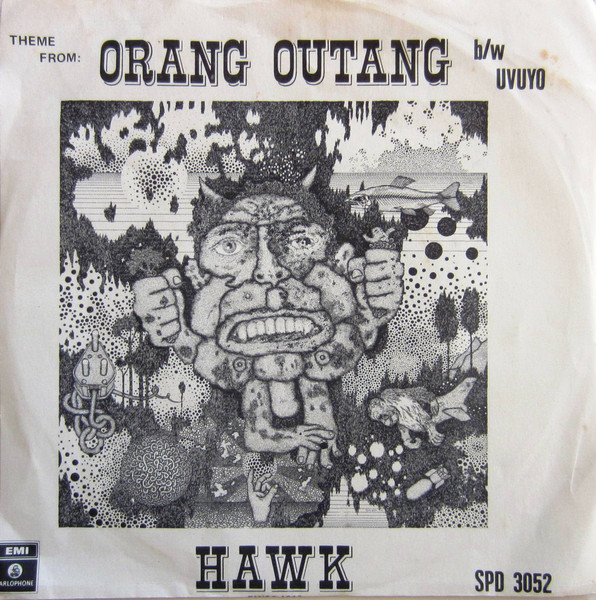
Orang Outang
Orang Outang (Ramsay MacKay) unreleased on an album /
Uvuyo (Dave Ornellas/ Mark Kahn/ Ramsay MacKay) (1972), EMI Parlophone, SPD 3052
"Orang Outang" was written by Ramsay MacKay and has been recorded many times including by Freedom's Children with Malombo Jazz Makers, Kenny Henson's Harambee, Margaret Singana, Joy and Brian Finch.
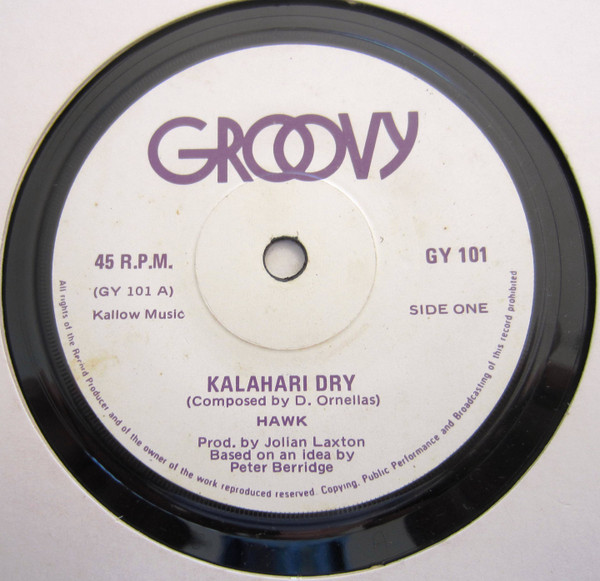
Kalahari Dry
Kalahari Dry (Dave Ornellas) unreleased on an album /
The Return (Mark Kahn) (November 1972) Groovy, GY 101
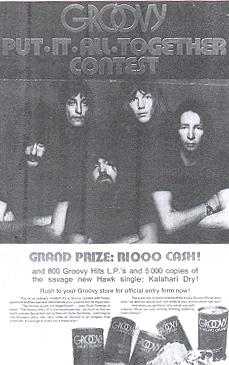
Advert from Sunday Times Supplement,
19 November 1972
Groovy was a brand of cooldrink in South Africa in the 1970s, that came in cans. "Kalahari Dry" was used as part of an advertising campaign.
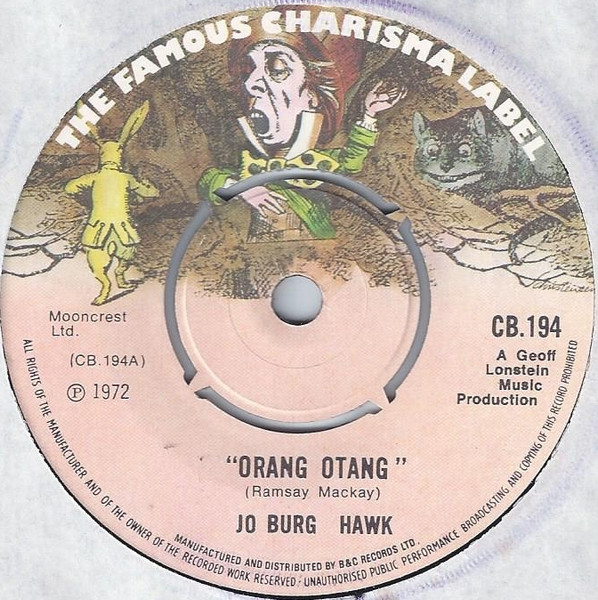
Orang Otang
Orang Otang (Ramsay MacKay) /
Dark Side Of The Moon (Ramsay MacKay) (UK, 1972) Charisma, CB 194 credited to Jo'Burg Hawk
I bought a 7" single at an old record shop here yesterday......'Orang Otang' by "Jo'Burg Hawk". I looked at the detail on the 'Africa she too can cry' page and noticed that my 7" single is not the same.
Mike Greeff, UK, September 1999
Cat no CB 194 on "The Famous Charisma Label" B&C Records
Produced 1972 (not 1973) by Geoff Lonstein
A side: Orang Otang (note different spelling!) composed by Ramsay Mackay
B side: Dark Side of the Moon composed by Ramsay Mackay
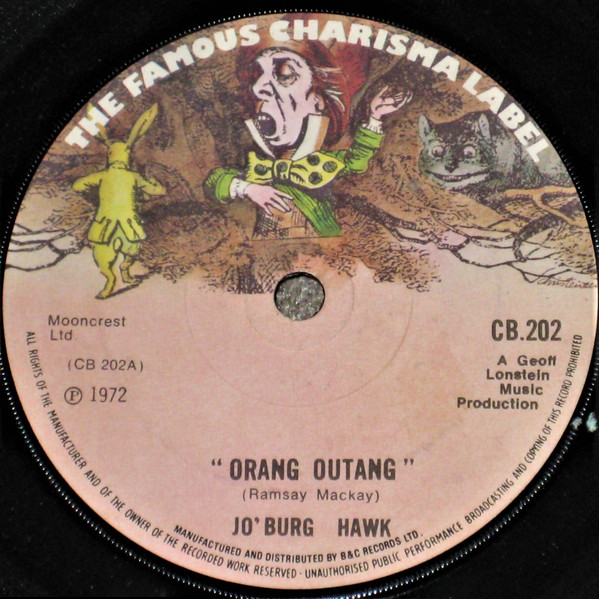
Orang Outang
Orang Outang (Ramsay MacKay) /
Dark Side Of The Moon (Ramsay MacKay) (UK, February 1973) Charisma, CB 202 credited to Jo'Burg Hawk
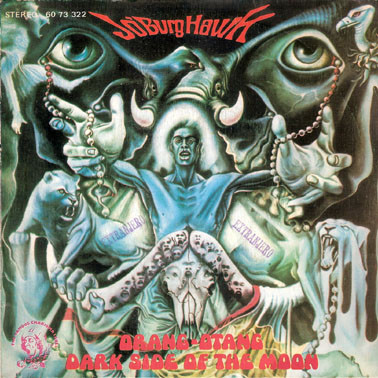
Orang Otang (Spain 1973) | Tertius Louw
"Orang Outang" (with slightly different spellings including "Orang Otang" and "Orang-Otan", and all credited to "Jo'Burg Hawk") was also released during 1972 and 1973 in Italy, Spain, Norway, The Netherlands, Germany and France. Please see Discogs for complete list.
'Orang Outang' was released on a Various Artists compilation in 1972 titled '25 Blockbusters' on EMI Brigadiers, catalogue number BRS (D) 340/1
Tertius Louw, May 2000
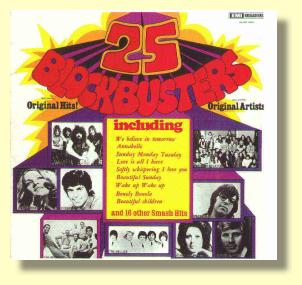
25 Blockbusters
Info and scans supplied by Tertius Louw, Mike Greeff, Andrew King and Discogs.